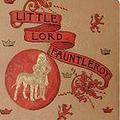Chapter 5 (6)
So the old man leaned back in his chair, and led his young companion on to telling him still more of himself, and with that odd gleam in his eyes watched the little fellow as he talked. Lord Fauntleroy was quite willing to answer all his questions and chatted on in his genial little way quite composedly. He told him all about Dick and Jake, and the apple-woman, and Mr. Hobbs; he described the Republican Rally in all the glory of its banners and transparencies, torches and rockets. In the course of the conversation, he reached the Fourth of July and the Revolution, and was just becoming enthusiastic, when he suddenly recollected something and stopped very abruptly.
"What is the matter?" demanded his grandfather. "Why don't you go on?" Lord Fauntleroy moved rather uneasily in his chair. It was evident to the Earl that he was embarrassed by the thought which had just occurred to him.
"I was just thinking that perhaps you mightn't like it," he replied. "Perhaps some one belonging to you might have been there. I forgot you were an Englishman." "You can go on," said my lord. "No one belonging to me was there. You forgot you were an Englishman, too." "Oh! no," said Cedric quickly. "I'm an American!" "You are an Englishman," said the Earl grimly. "Your father was an Englishman." It amused him a little to say this, but it did not amuse Cedric. The lad had never thought of such a development as this. He felt himself grow quite hot up to the roots of his hair.
"I was born in America," he protested. "You have to be an American if you are born in America. I beg your pardon," with serious politeness and delicacy, "for contradicting you. Mr. Hobbs told me, if there were another war, you know, I should have to--to be an American." The Earl gave a grim half laugh--it was short and grim, but it was a laugh.
"You would, would you?" he said.
He hated America and Americans, but it amused him to see how serious and interested this small patriot was. He thought that so good an American might make a rather good Englishman when he was a man.
They had not time to go very deep into the Revolution again--and indeed Lord Fauntleroy felt some delicacy about returning to the subject--before dinner was announced.
Cedric left his chair and went to his noble kinsman. He looked down at his gouty foot.
"Would you like me to help you?" he said politely. "You could lean on me, you know. Once when Mr. Hobbs hurt his foot with a potato-barrel rolling on it, he used to lean on me." The big footman almost periled his reputation and his situation by smiling. He was an aristocratic footman who had always lived in the best of noble families, and he had never smiled; indeed, he would have felt himself a disgraced and vulgar footman if he had allowed himself to be led by any circumstance whatever into such an indiscretion as a smile. But he had a very narrow escape. He only just saved himself by staring straight over the Earl's head at a very ugly picture. The Earl looked his valiant young relative over from head to foot.
"Do you think you could do it?" he asked gruffly.
"I think I could," said Cedric. "I'm strong. I'm seven, you know. You could lean on your stick on one side, and on me on the other. Dick says I've a good deal of muscle for a boy that's only seven." He shut his hand and moved it upward to his shoulder, so that the Earl might see the muscle Dick had kindly approved of, and his face was so grave and earnest that the footman found it necessary to look very hard indeed at the ugly picture.
"Well," said the Earl, "you may try." Cedric gave him his stick and began to assist him to rise. Usually, the footman did this, and was violently sworn at when his lordship had an extra twinge of gout. The Earl was not a very polite person as a rule, and many a time the huge footmen about him quaked inside their imposing liveries.

